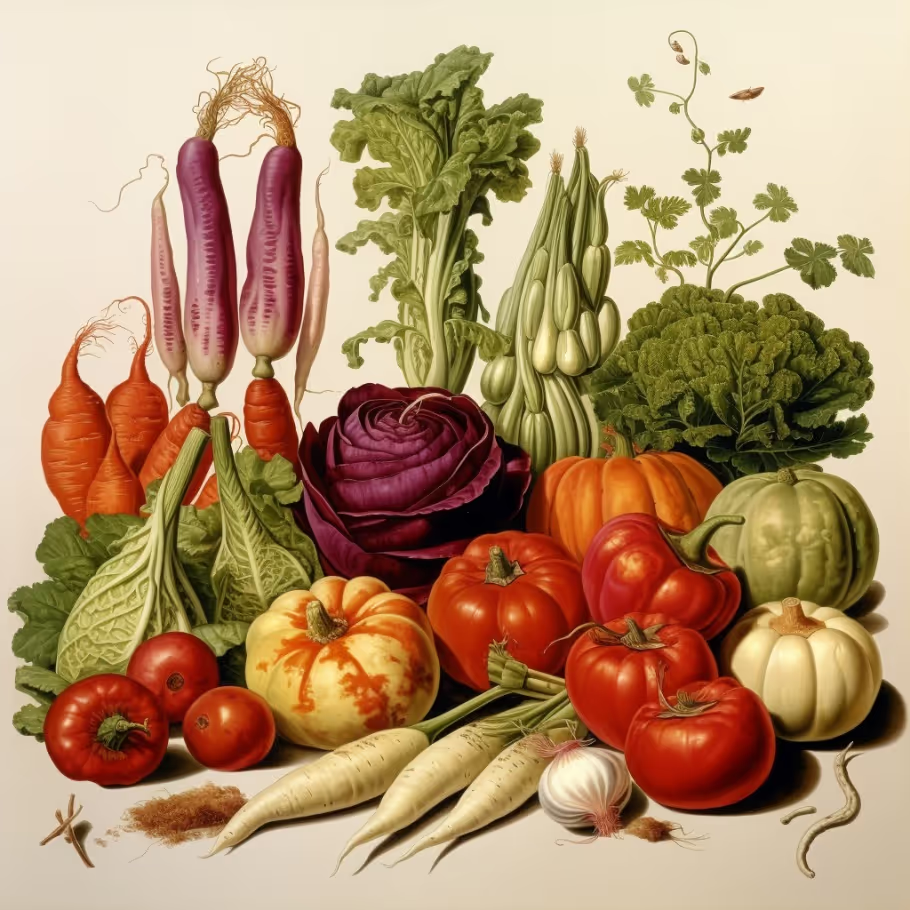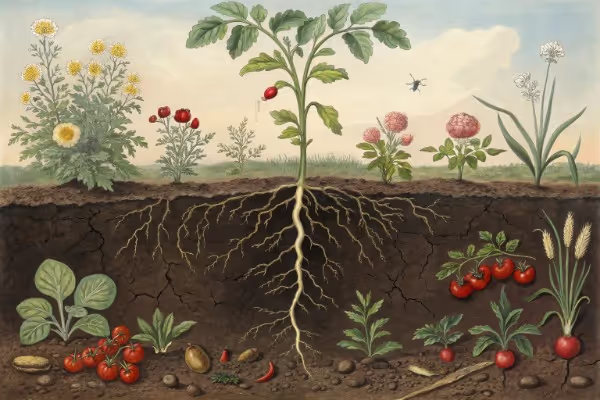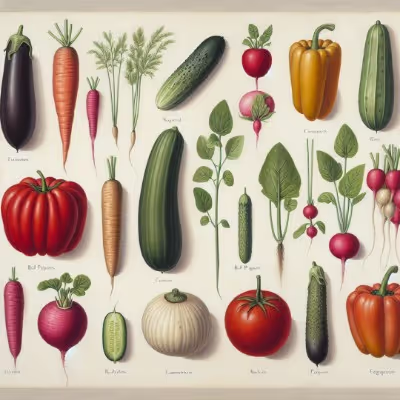Sweet Vegetables: A Garden Guide to Naturally Rich Flavors

Sweet vegetables
Plant sweet vegetables like beets, carrots, and parsnips early in cool soil to intensify their natural sugars. Frost sweetens vegetables by converting starches into sugars, making your harvest deliciously flavorful. Roast or caramelize these sweet vegetables to release their earthy aromas and satisfy your palate's sugar cravings naturally. Curious about cultivating nature's candy? Keep reading to uncover how to grow and savor garden-grown sweetness.
Cheatsheet: Growing Vegetables with Natural Sweetness
🥕 Best Sweet Varieties
- Carrots (‘Bolero’, ‘Sugarsnax’)
- Beets (‘Chioggia’, ‘Detroit Dark Red’)
- Sweet peas (‘Sugar Snap’, ‘Little Marvel’)
- Corn (supersweet types: ‘Honey Select’, ‘Iochief’)
- Sweet peppers (‘Lunchbox’, ‘King of the North’)
- Tomatoes (‘Sungold’, ‘Supersweet 100’)
🌱 Soil Prep & Sowing
- Loosen soil 12" (30 cm) deep. Remove stones.
- Add 2–4" (5–10 cm) of compost for moisture & nutrients.
- Maintain pH 6.0–7.0 for best flavor uptake.
- Sow seeds after last frost; soil must be 50–70°F (10–21°C).
☀️ Sun & Spacing
- 6–8 hours of direct sun daily.
- Follow seed packet spacing, e.g., carrots 2" (5 cm), beets 4" (10 cm).
💧 Water & Feeding
- Water evenly; root veggies need 1" (2.5 cm) per week.
- Mulch to lock in soil moisture, suppress weeds.
- Side-dress with balanced organic fertilizer at 3 weeks.
🎁 Harvest Timing
- Harvest early mornings for highest sugar content.
- Pick at peak size; overripe = less sweetness.
- Cool quickly after picking to retain flavor.
🌡️ Temperature Effects
- Chill sweetens: carrots, beets, parsnips get sweeter after light frost.
- Heat boosts sugars in sweet corn & tomatoes.
🛠️ Tools and Products You’ll Need
- Garden spade/fork
- Row marker
- Compost/organic matter
- Mulch (straw or leaf mold)
- Soil pH test kit
- Harvest knife
- Watering can or drip hose
🥗 Sweetness & Health
- High in beta-carotene, fiber, natural sugars.
- Peak flavor means more antioxidants, less need for added sugars.
- Growing your own boosts food independence.
📈 Quick Facts
- Sugar content in ripe Sungold tomatoes: 8–10° Brix.
- Cold-grown carrots can pack 40% more natural sugar than summer crops.
- Fresh-picked corn loses up to 50% sweetness after 1 day unrefrigerated.
📝 Steps (HowTo):
- Prepare soil with compost and test pH.
- Sow seeds at correct depth and spacing post-frost.
- Water consistently and mulch rows.
- Feed at 3 weeks with organic fertilizer.
- Harvest at blush of maturity; refrigerate promptly.
Sweet Vegetables: A Garden Guide to Naturally Rich Flavors
I grow for flavor first, yield second, and I have the stained harvest knives to prove it.
Sweet vegetables reward timing, restraint, and a little mischief with water and temperature.
How plants make sweetness
Sucrose, glucose, fructose are the sugars you taste, built in leaves from light, then moved through phloem to roots, fruits, pods, and bulbs.
I watch for strong midday photosynthesis and cool nights, since that day-night rhythm loads sugar then reduces its burn rate.
Brix is the grower’s shorthand for percent soluble solids, mostly sugars, read with a handheld refractometer.
Higher Brix usually tracks with better mineral balance, tighter cell structure, and flavor that lingers.
"Standard sweet corn can lose half its sugar within 24 hours at room temperature." Extension bulletins from land-grant universities have repeated this for decades.
Soil nutrition that feeds sweetness
Potassium drives sugar movement and turgor, so low K often tastes flat even when plants look green.
After a soil test, I correct K with sulfate of potash for veg, then listen to the leaves, margins crisp when K runs short.
Boron helps sugar transport and cell wall integrity, tiny dose, big effect.
I use a light touch, about 1 tablespoon borax per 100 sq ft, 10 to 12 g per 9 m², only if a soil report flags a shortage, since overdoing boron bites hard.
Magnesium sits at the center of chlorophyll, and phosphorus fuels energy transfer, so skimping steals sweetness a few weeks later.
Compost plus a balanced mineral plan beats chasing symptoms with foliar spritzes.
Water, temperature, and the sweet spot
Steady moisture lets carrots, beets, and peas stack sugars without stress bitterness, I mulch and use drip to avoid swings.
Late-season carrots cross into candy after a light frost, 28 to 32 F, minus 2 to 0 C, a survival trick called cold-sweetening.
Peppers, onions, and squash gain density with slightly lean irrigation as fruit matures, never during early bulking.
I stop water on winter squash 7 to 10 days before harvest in dry weather, which concentrates flesh without toughening skin.
Variety choice matters more than bravado
Genes set the ceiling, management lifts you to it.
Seed tags tell you a lot if you know the code.
- Sweet corn: su, se, and sh2 types differ wildly, I grow sh2 for snap and storage, Mirai or Xtra-Tender series, and se types like Honey Select for field eating.
- Carrots: Bolero, Nelson, Yaya, and Napoli hold sugar even in heavier loam.
- Beets: Touchstone Gold and Red Ace taste mellow, Chioggia is sweet but bleeds flavor fast if overwatered.
- Peas: Sugar Snap, Cascadia, and Sugar Ann give high Brix in cool springs.
- Sweet peppers: Carmen, Escamillo, and Lipstick color up fast, sugars spike at full red or yellow.
- Winter squash: Honeyboat delicata, Sunshine kabocha, and Thelma Sanders go nutty-sweet after a cure.
- Sweet potatoes: Covington, Beauregard, and Murasaki, cure at 80 to 85 F, 27 to 29 C, for 7 to 10 days.
- Onions: Walla Walla, Candy, Ailsa Craig, sweetness comes from lower pungency and higher water content, not extra sugar.
- Fennel bulb: Perfection and Zefa Fino, sweet with steady moisture and cool nights.
- Turnips: Hakurei and Tokyo Cross, eaten small for crisp sweetness.
- Brussels sprouts: Hestia or Diablo, sweeter after hard chills.
- Parsnips: Gladiator, dug after several freezes for syrupy cores.
Timing and cultural tricks that stack sugars
I sow fall carrots 10 to 12 weeks before first frost, then leave them in ground under a low tunnel, they sweeten each cold snap.
Peas go in as soon as soil hits 40 F, 4 C, and I harvest pods in late afternoon, sugars peak after a sunny day.
For corn, I plant when soil stays at 60 F, 16 C, or warmer, cold soil stunts enzymes that build sugar.
I pick corn at dawn and chill it fast, a cooler with ice water keeps kernels sparkling.
Sweet potatoes need heat to build maltose, the sugar you taste after curing.
I never skip the cure, then hold them at 55 to 60 F, 13 to 16 C, for storage.
Postharvest handling that preserves sweetness
Respiration burns sugar, so I cool produce that should stay sweet, peas and corn go cold immediately, 32 to 36 F, 0 to 2 C.
Tomatoes and winter squash are different, room temp for flavor development, never a fridge trap.
"Sh2 sweet corn stores longer because sugars convert to starch more slowly than su types." UF/IFAS and Midwest extension sheets align on this point.
Measuring sweetness like a pro, without fuss
A simple refractometer reads Brix in seconds, I calibrate with distilled water to 0, wipe, then squeeze a drop of juice from a slice.
Targets I trust, carrots 10 to 12, peas 12 to 18, peppers 8 to 12, winter squash 12 to 16 after curing, sweet corn 18 to 24 on a good morning.
Flavor chemistry, simplified
Sweetness rarely lives alone, acids and aromatics frame it, so a tomato or pepper with modest Brix can taste vivid if acids and volatiles line up.
Onions prove the point, low sulfur soils make milder, perceived sweeter onions, University of Georgia’s Vidalia program has built an entire identity on that soil reality.
Soil life and sweetness
Mycorrhizal fungi extend roots and improve phosphorus uptake, which supports sugar production under stress.
Cover crops like crimson clover and oats keep biology humming, then I terminate early to avoid tying up nitrogen when transplants need to push.
Stress, used like a spice
Light, controlled stress concentrates flavor, heavy stress smears it with bitterness.
I taper water as peppers color, then stop two or three days before a forecasted hot spell, which tightens skins and nudges sugars without wilting.
Harvest cues I trust more than calendars
Carrots snap louder when sweet, parsnips smell like maple when cut, and delicata seeds rattle when the flesh has set starch properly.
Peppers taste green until the pith turns sweet, I nibble the white ribs, if they read sweet, the fruit follows in a day or two.
Top 10 quick wins for sweeter harvests
- Pick varieties bred for sweetness, the seed packet genotype code matters.
- Warm soil before planting heat lovers, use black mulch or low tunnels if spring lags.
- Soil test yearly, correct K and boron carefully, then recheck.
- Use drip irrigation to keep moisture steady, mulch to buffer swings.
- Thin aggressively, crowded plants dilute sugars.
- Harvest with the sun, late afternoon for peas and greens, early morning for corn.
- Cure what needs curing, winter squash and sweet potatoes move from good to memorable after a proper cure.
- Chill fast or hold warm based on crop physiology, avoid the one-temp-fits-all trap.
- Track Brix weekly near harvest, adjust water for a final nudge.
- Record everything, today’s numbers feed next year’s sweetness.
Buying tips, tools, and inputs that earn their keep
- A reliable refractometer with ATC, automatic temperature compensation, and a spare pipette, small cost, big guidance.
- Soil test from a reputable lab, ask for CEC, organic matter, and micronutrients, not just NPK.
- Potassium sulfate and a tiny box of borax on hand, used only after test results.
- Row cover, 0.5 to 0.9 oz, 17 to 30 g, for early heat and frost-kissed sweetness timing.
- Drip line and a simple timer, 1 gph emitters, 3.8 L per hour, to ration water with precision.
Field notes that changed how I grow
One July, my peppers tasted watery, the Brix meter tattled at 6, I cut irrigation to every third day, mulched again, and in a week they climbed to 10 with bellies of perfume.
Another season, I chased big beets and got bland, the next year I thinned to 4 inches, 10 cm, and the sweetness came roaring back.
Science corner, with receipts
USDA ARS papers tie potassium status to sugar translocation, and plenty of extension guides echo the boron link to phloem function.
Cornell, Penn State, and UC Davis explain why cold nights and slow respiration preserve sugars, and why su corn rushes starch conversion compared with sh2.
I keep those ideas dirty, in practice, and measure with my knife and meter.
Sugar rewards growers who pay attention, plant by plant, day by day.

Want smarter plant choices? 🪴
Sweet Vegetables FAQ: Your Top Questions Answered
Which vegetables naturally bring sweetness to dishes?
Vegetables like carrots, sweet potatoes, beets, and butternut squash deliver earthy sweetness that tempers bitterness and sharpness in savory recipes. Roasting these vegetables caramelizes their natural sugars, producing depth and complexity.
How can sweet vegetables enhance cooking without added sugars?
Employing sweet vegetables skillfully transforms dishes by balancing flavors and injecting body. Their subtle natural sugars deepen soups, enrich sauces, and round off stews, conjuring gastronomic harmony without synthetic sweeteners.
What's the ideal cooking method for maximizing sweetness in vegetables?
Roasting vegetables at moderate to high heat encourages caramelization, that exquisite chemical transformation where sugars turn golden and aromatic. Alternatively, slow sautéing or braising extracts sugars gradually, building layers of nuanced sweetness.
Can sweet vegetables contribute meaningfully to a healthier diet?
Absolutely. Sweet vegetables offer fiber, vitamins, and antioxidants alongside their natural sugars. Incorporating them into meals curbs cravings for refined sugars, supports digestion, and fortifies overall nutritional balance.
Are certain sweet vegetables suited better for specific culinary traditions?
Indeed, cultural traditions spotlight particular sweet vegetables: Japanese cuisine reveres the subtle sweetness of kabocha squash and roasted sweet potato; Mediterranean dishes favor caramelized red onions and grilled bell peppers; and Latin American cooking celebrates sweet corn and plantains as staple ingredients.
Growing sweet vegetables is about patience, sunlight, and a good patch of earth. The flavor comes from choosing the right varieties, picking the right moment to harvest, and giving your plants just the right amount of care. Rich soil and steady watering do half the work—nature does the rest. If you’re hungry for more depth in your garden, check out these nutrient-dense vegetables or get into vegetable breeding for even richer flavors. The best meals start in the dirt. With the right attention, your backyard will reward you with honest, natural sweetness—no sugar needed.
Health Benefits of Growing Sweet Vegetables
Boost Natural Immunity
- Beta-carotene Source: Carrots and sweet potatoes provide beta-carotene, supporting a healthy immune response and vision.
- Vitamin C-Rich Choices: Bell peppers and sweet peas deliver vitamin C, aiding collagen production and increasing antioxidant defense.
Support Heart Health Naturally
- Potassium-Rich Veggies: Sweet beets and squash balance blood pressure by supplying heart-healthy potassium (average: 300-400mg per 100g).
- Dietary Fiber Power: Sweet corn, carrots, and parsnips offer dietary fiber (2-4g per serving) promoting cholesterol control and digestive health.
Enhance Natural Energy Levels
- Complex Carbohydrate Boost: Butternut squash, sweet potatoes, and carrots deliver sustained-release complex carbohydrates for steady daily energy.
- B-Vitamin Support: Sweet vegetables like acorn squash contain B-vitamins vital for energy metabolism and nerve function.
Promote Self-Sufficient Nutrition
- Reliable Harvest: Sweet root crops such as carrots, beets, and sweet potatoes store well, offering year-round nutritional independence.
- Easy Preservation: Sweet peas and corn freeze and can efficiently, supporting long-term food preparedness at home.
Notable Nutritional Statistic
Homegrown carrots harvested fresh retain up to 75% higher antioxidant levels compared to commercially-stored options, enhancing nutritional value significantly.
Find out which plants will thrive in your garden!
Answer a few fun questions and get custom plant recommendations perfect for your space. Let’s grow something amazing together!

start your season





